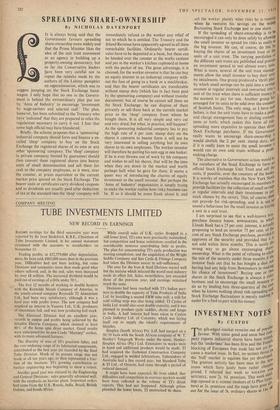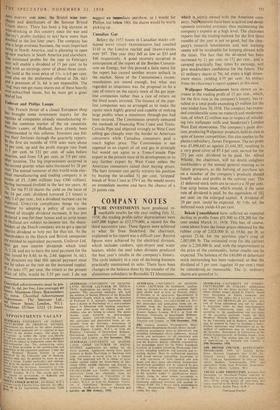INVESTMENT NOTES
By CUSTOS
THE gilt-edged market remains out of popular favour. With some good and some bad ertinid: pany reports industrial shares have been mix but the `undertone' has been firm and the Fran blocking of European free trade has not yet bec; come a market issue. In fact, no serious threat d, the `bull' market in equities has yet develoPew The greatest activity has been seen in the finly e issues which have lately been rather cheaply priced. I referred last week to WILKINS Ai. MITCHELL, now 2s'. 9d. premium. This week `'e„. ings opened in E. GOMME (makers of G-Plan fu ture) at 2s. premium and the stags have gone aof out for the issue of 5s. ordinary shares at I is JOHN HARVEY AND SONS, the Bristol wine mer- chants and distributors of the famous Bristol Cream sherry. There has been a big increase in wine-drinking in this country since the war and Harvey's profits (subject to tax) have more than doubled in the last four years. The company has also a large overseas business, the most important being in North America. and is planning to open „LIP new markets in South America and elsewhere. fhe estimated profits for the year to February next will enable a dividend of 15 per cent, to be Paid with an earnings cover of about three times. The yield at the issue price of I Is. is 6.8 per cent. (and also on the preference offered at 20s. 6d.) and a premium of 2s. 6d. is not impossible. The stag' may not get many shares out of these heavily over-subscribed issues, but he must get a great deal of fun.
Unilever and Philips Lamps
, The French threat of a closed European shop has brought some investment inquiry for the e9uities of companies already manufacturing in- side the common market of the six countries, P(((UPS LAMPS, of Holland, have already been !ceommended in this column. Investors can fol- IOW their fortunes through the quarterly reports. In the first six months of 1958 sales were about 10 per cent. up and the profit margin rose from 11.7 per cent. to 121 per cent. of sales before taxation, and from 5.8 per cent, to 5.9 per cent. after taxation. The big improvement occurred in the second quarter when sales increased by 28 per cent. The annual turnover of this world-wide elec- trical manufacturing and trading company is in excess of Fl. 3,000 millions (say £300 million), having increased fivefold in the last ten years. At ,s. for the FI.10 shares the yield on the basis of tile 14 per cent, dividend (covered 2.3 times) is °IllY 3.45 per cent., but a dividend increase can be expected. UNILEVER complicates things for the investor by adopting a policy of scrip issues instead of straight dividend increases. It has just declared a one-for-four bonus and as scrip issues In Holland are subject to- income tax, the share- holders of the Dutch company are to get a special Interim dividend to help pay for that tax. As the shareholders in the Dutch and British companies are entitled to equivalent payments, Unilever Ltd. 450 get two interim dividends which total 's. 1.2d. and are to have the total payment for the Year raised by 8.4d. to 4s. 2.4d. (against 3s. 6d.). The directors say that this special payment must not be taken as the rate on the increased capital. ,1 'f We take 171 per cent. the return at the present Price of 103s: would be 3.35 per cent. I do not
suggest an immediate purchase, as I would for Philips, but below 100s. the shares would be worth picking up.
Canadian Gas Before the 1957 boom in Canadian stocks col- lapsed WEST COAST TRANSMISSION had touched $110 in the London market and TRANS-CANADA PIPE $97. This year they fell as low as $35 and $40 respectively. A good recovery occurred in anticipation of the report of the Borden Commis- sion on Energy, but this proved a false move for the report has caused another severe setback in the market. Some of the Commission's recom- mendations are sound enough, but what was regarded as iniquitous was the proposal to fix a rate of return on the equity stock of the gas pipe- line companies rather than a rate of return on the fixed assets invested. The finance of the pipe- line companies was so arranged as to make the equity stock highly geared and capable of making large profits when a maximum through-put had been secured. The Commission severely censured the methods of financing West Coast and Trans- Canada Pipe and objected strongly to West Coast selling gas cheaply over the border to American consumers while Canadian consumers paid a much higher price. The Commission is not opposed to an export of oil and gas in principle but would not agree to a Trans-Canada Pipe export in the present state of its development or to any further export by West Coast unless the American consumers raised their buying prices. The hurt investor can partly retrieve his position by buying the so-called 51 per cent. 'stripped' bonds of West Coast at $79 Can. He would secure an immediate income and have the chance of a 20 points rise.















































































 Previous page
Previous page